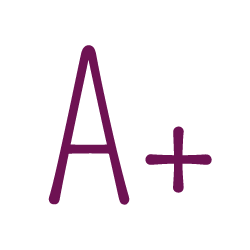 I bet you were a straight A student. You got lots of praise for being a straight A student. You’ve lived your life thinking being a straight A student is a good thing.
I bet you were a straight A student. You got lots of praise for being a straight A student. You’ve lived your life thinking being a straight A student is a good thing.
It’s not.
It encourages all or nothing thinking: If you aren’t going to get an A, it’s not worth doing at all.
It discourages prioritizing: Once you’ve selected your focus areas, you need to give all of them whatever they need to get you that A.
It only values what can be graded: I bet you let self-care, relationships, exercise, and everything else drop off if you needed extra time/energy to maintain those As.
It gives excessive power to external validation: To get an A, you need to meet someone else’s criteria for excellence. Someone else gets to define the important learning goals for the course. Someone else gets to decide how to measure your attainment against those goals.
Fast forward to now.
You are overworked. You feel like you can’t meet all the requirements of the job in a reasonable working week. You might struggle with perfectionism. You have trouble setting limits on how much time and energy you put into different tasks.
Through the “straight A student” lens, setting time and energy limits on your teaching preparation feels like admitting up front that you aren’t committed to being a good teacher. Setting time and energy limits on service work feels like not being a good colleague.
Even putting in “whatever it takes”, you feel like you aren’t doing enough because there is no one putting that “A” on your work. At best, your colleagues are telling you you are doing fine. “Doing fine” sounds like the kind of thing B and C students care about. You have always heard “doing fine” and “good enough” as failing. Those aren’t the kinds of words that are associated with straight As.
How can you do less in those circumstances? Clearly you have to do more? Because right now you are only “doing fine”?
“Doing fine” really *is* fine.
There is a level below which you will lose your job. But once you take off the “straight A” glasses, you will see that there is a lot of space between “A” and “fail”. You’re expected to get As in some things. Bs in others. And most employers will tolerate a C from time to time.
You are part of a team. There are ways of allocating the work that means you can effectively delegate stuff you’d only get a C in, substituting it with something you’d get a B or better in. The things you don’t like doing, aren’t very good at, or otherwise would end up getting a C in, are things that one of your colleagues finds easy, really enjoys, and would get a B or an A without much trouble.
One of the keys to a sane life is prioritizing.
There are a lot of things you could do, but time and energy are finite. Some of those things are more rewarding for you. Some of those things are easier. Some of those things are more important (to you or to others). Within the constraints provided by the terms of your employment, what is most important to you?
This might be a really difficult question to answer. You may be so locked into a perspective focused on meeting the expectations of others that you have forgotten how to even determine what’s important to you.
Knowing this and being able to make judgements about the relative priority to you and to others who matter is crucial to successfully taming your workload and enjoying your work.
Related posts:
Wondering what happened to your class valedictorian? Not much, research shows. Eric Barker, Time Magazine, May 18, 2017.
The frustrations of being a dedicated teacher.
Lies you’ve been told about loving your work
Edited March 28, 2016; related post added May 24, 2017.








[…] Related Post: Hat tip to Tanya Noel for pointing me to this post on a related topic […]